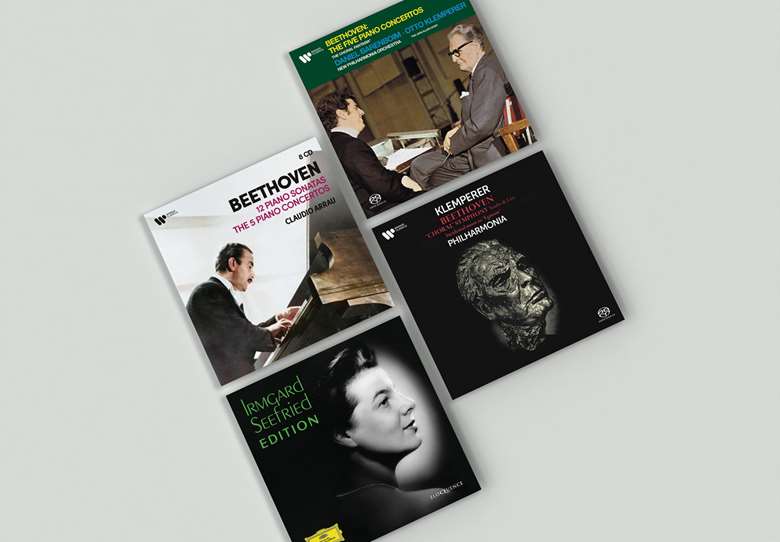New box-sets: Beethoven from Barenboim, Arrau and Klemperer, plus Irmgard Seefried Edition
Rob Cowan
Thursday, April 17, 2025
Rob Cowan on a bumper Beethoven crop and the voice of a seraphic soprano

Two sets of Beethoven piano concertos roughly 10 years apart typify the sonic progress that EMI/Warner made between the late 1950s and the late 1960s, the early recordings featuring Claudio Arrau with the Philharmonia under Alceo Galliera, the later accounts Daniel Barenboim, then in his 20s, and the New Philharmonia conducted by the octogenarian Otto Klemperer. The producer for the Philharmonia sessions was Walter Legge, and for the New Philharmonia recordings Suvi Raj Grubb. Both sets were taped in Studio No 1 at London’s Abbey Road but the difference between them defies belief, the productions of Legge and his team are opaque but cold, whereas Grubb’s team sports seductively silken strings, with added warmth from the basses and realistic winds and brass. This truly was a new era for the orchestra on record, a loving embrace for the stereo age, unlike Legge’s which, with its constricted, almost grudging stereophony, is more an elasticated wall of sound. Happily, Klemperer stood his ground and because of his insistence on forward-placed winds and spatially divided violins (even in the old Philharmonia days) always sounded himself.
As indeed he does in the concertos with Daniel Barenboim. Neither is he bowed by age, the finales especially fresh and sprightly, Klemperer evidently enjoying the ride, Art & Son’s remastering (the same as on ‘Otto Klemperer: The Warner Classics Remastered Edition’ – 10/23) superb. Barenboim and Klemperer deliver an especially impressive account of the Second (really the first) Concerto, weightier than usual but imbued with life. But perhaps the most impressive movement of all is the central Andante con moto from the Fourth Concerto which, although close in timing to Arrau’s (5'46"/5'38") gains substantially with momentous lower strings that accentuate the dialogue between an imagined deity (orchestra) and a humble penitent (pianist).
Barenboim’s playing is polished and respectfully cooperative, Claudio Arrau’s crisply articulated and rich in detail. He offers us 12 sonatas in addition, all thoughtfully interpreted (and in general rather more animated than his Philips remakes) – Nos 7, 14, 18, 21-24, 26, 28 and 30‑32 plus the Variations in C minor, most, though not all, in mono (as is the Fourth Concerto). Again, the Art & Son refurbishments are excellent. It’s worth recalling that back in 2004 Testament released Concertos Nos 3‑5 as recorded live at the Royal Festival Hall in 1957 by Arrau, the Philharmonia and Klemperer, a distinguished collaboration according to Richard Osborne (11/04). A pity they weren’t included as a bonus in the set under review.
If you don’t already own this monumental Ninth, here’s your chance
The Barenboim/Klemperer collection also includes the Choral Fantasia for piano, chorus and orchestra, often noted as a precursor to the later Choral Symphony. And from that same live Otto Klemperer Beethoven series in 1957 comes the newly reissued live Ninth, recorded by Legge as a failsafe in case the planned studio recording didn’t materialise. Warner’s latest reissue couples both together, the studio option (same period) capturing Klemperer’s orchestral layout with greater clarity, the live performance adding an extra measure of spontaneity, with tumultuous applause at the end. If you don’t already own this monumental Ninth, here’s your chance.
A more intimate case of ‘like with like’ finds that most seraphic of sopranos Irmgard Seefried singing Schubert’s lied ‘Der König in Thule’ – ‘faithful until he went to his grave, and to whom, when she was dying, his mistress gave a golden beaker’. Two recordings are included in Eloquence’s handsome ‘Irmgard Seefried Collection’, the first (on disc 11) from 1957, the second (on disc 3) from 1962, both accompanied – as are most of the songs on this wonderful set – by Erik Werba. Listening ‘blind’, however, I’d never have guessed that the same singer was giving both performances, the earlier version higher in pitch with words uncharacteristically indistinct, the second spoken as much as sung, the words this time shaped and sculpted with the utmost poignancy.
Newcomers to this latest Seefried collection (much of the featured material was previously issued by Eloquence on single CDs) can enjoy a first-ever release of music from Mozart’s Così fan tutte under Ferdinand Leitner, a first CD release of ‘Irmgard Seefried in Person’, where the singer can be heard recounting, in considerable detail, highlights from her career (her words alternating with musical excerpts), happily translated in the booklet, and finally another first CD release, ‘Erik Werba Accompanies You’, being all but one of the songs featured in the main set (including the whole of Schumann’s Frauenliebe und -leben) where Werba plays alone, a sort of ‘music minus one’. Elsewhere, a plethora of different works, including (on disc 12) songs taken down during a concert tour, Bartók’s Village Scenes feistily sung and, as throughout the set, superbly accompanied by Werba. Elsewhere you’ll find excerpts from major religious works and operas. Tully Potter provides notes that are personal and informed. If you’ve an ear for voices that are natural, distinctive and filled with emotion, this set is unmissable.
The recordings
Beethoven Pf Concs Barenboim, Klemperer Warner Classics
Beethoven Pf Concs, etc Arrau, Galliera Warner Classics
Beethoven Sym No 9 Klemperer Warner Classics
Irmgard Seefried Edition DG Eloquence













